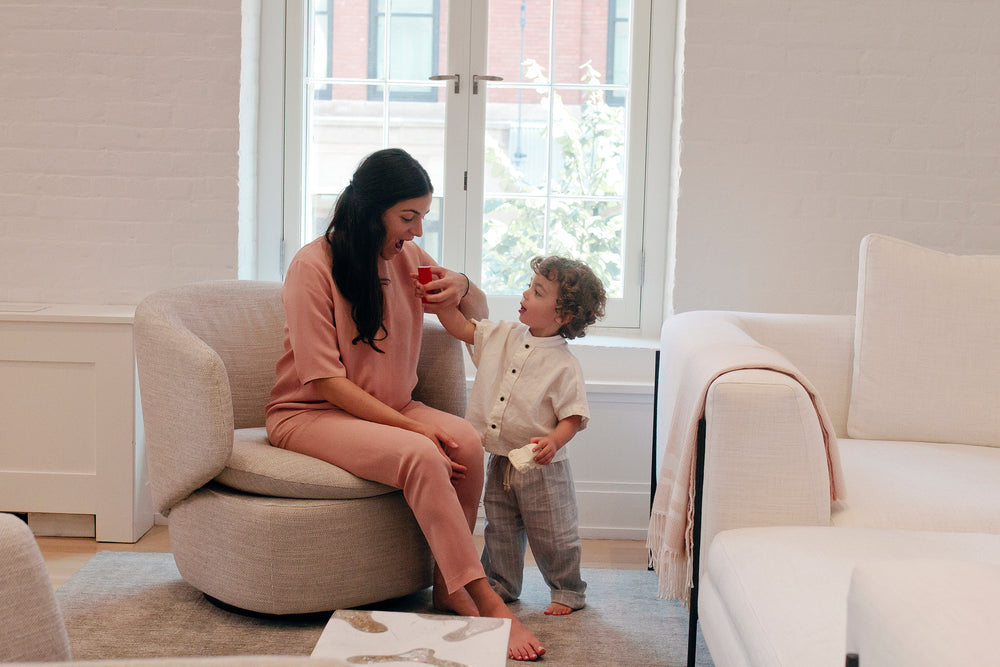Easy Ways to Become a Pro at Playing


If you’ve ever watched your child play and found yourself thinking, “I wish I knew how to play…”, or “How can I become more playful?”, or “I want to play but there’s not enough time in the day…”, you’re not alone. As adults, we’re often disconnected from our playful, child-like side (we had to “grow up” after all!). On top of that, finding time in the Age of Packed Schedules can feel like a daunting task. It’s no wonder that when it comes to playing with children, many adults are faced with a big question mark. Here’s the great news: there are a variety of easy ways to enrich your imaginary play abilities and bring a playful touch to every day. From improving one-on-one play, to using play as a communication strategy, to simply being present in new ways, find the playful-parenting styles that are right for you.
Ask open-ended questions.
Open-ended questions invite more than a ‘yes’ or ‘no’ answer. Use these to enhance communication during playtime together and everyday conversations, like when you inquire about how their day at school went. Simply tweak your questions from suggesting direct ideas to inviting an open, descriptive response. For example, “Share a memorable moment from your day…” is open-ended whereas, “Did you have a good day?” only offers one idea. During play, try “What would a rocket ship look like?” or “Tell me about the rocket ship you’re building” rather than “Are you building a rocket ship?” This adjustment in question-asking can open up new worlds.
Let your child lead play—and join them.
For the parent that really feels out of their element when it comes to playtime, this is the easiest way to learn how to play again. Think: follow the leader. If your little one is pretending to be a bird, flap your arms and join the fun. Enter their imaginary world willingly as a play buddy and enjoy the direct connection you’ll share as a result. P.S. physically getting down to your child’s level so you’re eye to eye is perfect place to start.
Share what you notice.
Here’s another way to polish up your play-speak to maximize playtime. In general, concrete observations are more impactful than compliments. Just state what you notice about your child’s creative choices as they play. Confidently make objective statements like, “I notice you placed the blue block on top of the purple block” or “I notice you’re working hard on a new outfit for your doll.” By doing so, you validate their creative process—a process they’ve controlled—and make them feel seen and supported. Remember, the trick is to steer clear of opinions, even when positive!
Proudly make mistakes.
Knock down your block tower. Scribble over your drawing. Mess it up! As adults, we can be hard on ourselves when we make mistakes but we should practice welcoming them during playtime. By modeling that mistakes are okay, you combat a culture a perfectionism, teach young children how to foster a healthy relationship with trial and error, and help nurture their problem-solving abilities and perseverance.
Become a “playful” communicator.
Shift your lens in difficult moments and use play as a communication strategy. Instead of arguing back and forth with your child about brushing his/her teeth, for example, take on the role of the character and turn the process into a playful game or try creating a funny story to transform their perspective.
Live in the moment (for real).
Most importantly, being a playful parent means being present. The easiest way to become a play pro is to unplug from technology and actively engage. Start with 30 minutes of tech-free play together. Bring a renewed awareness to your shared moment and simply be. Playing with our kiddos not only reinforces our bond with them, it supports our own stress reduction and well-being too.
Recent Articles
-
Playful Primer 10 Must-Have Toys for Your Next Backyard BBQ
Summer is just around the corner and we're ready for it! From backyard BBQs to neighborhood park outings, we've discovered...
read more -
Playful Primer Tips & Toys to Support Group Play Experiences
Catching a glimpse of children happily engaged in pretend play is like witnessing pure magic. Ever wonder how closely you...
read more -
Playful Primer 5 Ways to Strengthen the Bond Between Siblings
“I’ll take care of the bike. You take care of each other.” This is what I said to my children...
read more
